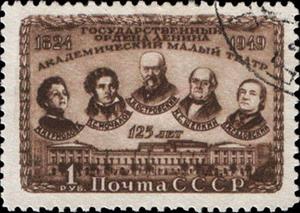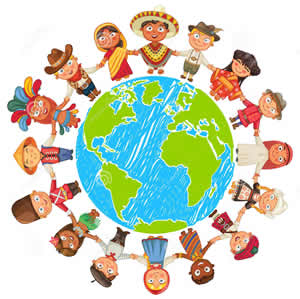Stamp: Playwright A. Ostrovsky and famous actors of Maly Theatre (Soviet Union, USSR 1949)
Playwright A. Ostrovsky and famous actors of Maly Theatre (Soviet Union, USSR 1949)
27 October (Soviet Union, USSR ) within release 125th Anniversary of Maly Theatre goes into circulation Stamp Playwright A. Ostrovsky and famous actors of Maly Theatre face value 1 Russian ruble
| Stamp Playwright A. Ostrovsky and famous actors of Maly Theatre in catalogues | |
|---|---|
| Michel: | Mi:SU 1396 |
Stamp is horizontal format.
Stamp Playwright A. Ostrovsky and famous actors of Maly Theatre it reflects the thematic directions:
Famous People refers to the fame and public attention accorded by the mass media to individuals or groups or, occasionally, animals, but is usually applied to the persons or groups of people (celebrity couples, families, etc.) themselves who receive such a status of fame and attention. Celebrity status is often associated with wealth (commonly referred to as fame and fortune), while fame often provides opportunities to make money.
A culture is a way of life of a group of people--the behaviors, beliefs, values, and symbols that they accept, generally without thinking about them, and that are passed along by communication and imitation from one generation to the next. Culture is symbolic communication. --the behaviors, beliefs, values, and symbols that they accept, generally without thinking about them, and that are passed along by communication and imitation from one generation to the next. Culture is symbolic communication.
Architecture (Latin architectura, from the Greek ἀρχιτέκτων arkhitekton "architect", from ἀρχι- "chief" and τέκτων "builder") is both the process and the product of planning, designing, and constructing buildings and other physical structures. Architectural works, in the material form of buildings, are often perceived as cultural symbols and as works of art. Historical civilizations are often identified with their surviving architectural achievements.
An actor (or actress for females) is a person who portrays a character in a performance. The actor performs "in the flesh" in the traditional medium of the theatre, or in modern mediums such as film, radio, and television. The analogous Greek term is ὑποκριτής (hupokritḗs), literally "one who answers". The actor's interpretation of their role pertains to the role played, whether based on a real person or fictional character. Interpretation occurs even when the actor is "playing themselves", as in some forms of experimental performance art, or, more commonly; to act, is to create, a character in performance.
Theatre or theater is a collaborative form of performing art that uses live performers, usually actors or actresses, to present the experience of a real or imagined event before a live audience in a specific place, often a stage. The performers may communicate this experience to the audience through combinations of gesture, speech, song, music, and dance. It is the oldest form of drama, though live theatre has now been joined by modern recorded forms. Elements of art, such as painted scenery and stagecraft such as lighting are used to enhance the physicality, presence and immediacy of the experience. Places, normally buildings, where performances regularly take place are also called "theatres" (or "theaters"), as derived from the Ancient Greek θέατρον (théatron, "a place for viewing"), itself from θεάομαι (theáomai, "to see", "to watch", "to observe").
A building or edifice is a structure with a roof and walls standing more or less permanently in one place, such as a house or factory. Buildings come in a variety of sizes, shapes and functions, and have been adapted throughout history for a wide number of factors, from building materials available, to weather conditions, to land prices, ground conditions, specific uses and aesthetic reasons. Buildings serve several needs of society – primarily as shelter from weather, security, living space, privacy, to store belongings, and to comfortably live and work. A building as a shelter represents a physical division of the human habitat (a place of comfort and safety) and the outside (a place that at times may be harsh and harmful).
A playwright or dramatist is a person who writes plays, which are a form of drama that primarily consists of dialogue between characters and is intended for theatrical performance rather than just reading. Ben Jonson coined the term "playwright" and is the first person in English literature to refer to playwrights as separate from poets.
An anniversary is the date on which an event took place or an institution was founded in a previous year, and may also refer to the commemoration or celebration of that event. For example, the first event is the initial occurrence or, if planned, the inaugural of the event. One year later would be the first anniversary of that event. The word was first used for Catholic feasts to commemorate saints. Most countries celebrate national anniversaries, typically called national days. These could be the date of independence of the nation or the adoption of a new constitution or form of government. The important dates in a sitting monarch's reign may also be commemorated, an event often referred to as a "Jubilee".







